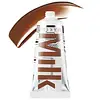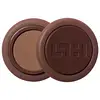What's inside
What's inside
 Key Ingredients
Key Ingredients

 Benefits
Benefits

 Concerns
Concerns

 Ingredients Side-by-side
Ingredients Side-by-side

Butyrospermum Parkii Butter
Skin ConditioningSimmondsia Chinensis Seed Oil
EmollientCaprylic/Capric Triglyceride
MaskingKaolin
AbrasiveSilica
AbrasiveOleic/Linoleic/Linolenic Polyglycerides
EmollientC9-12 Alkane
SolventTribehenin
EmollientVp/Hexadecene Copolymer
Octyldodecanol
EmollientVp/Eicosene Copolymer
Candelilla Cera
EmollientRicinus Communis Seed Oil
MaskingSr-Hydrozoan Polypeptide-1
HumectantTremella Fuciformis Sporocarp Extract
AntioxidantGanoderma Lucidum Stem Extract
Skin ConditioningTocopherol
AntioxidantAscorbyl Palmitate
AntioxidantDisteardimonium Hectorite
StabilisingWater
Skin ConditioningCaprylyl Glycol
EmollientGlyceryl Rosinate
PerfumingSodium Hyaluronate
HumectantCitric Acid
BufferingPotassium Sorbate
PreservativeCI 77891
Cosmetic ColorantIron Oxides
Butyrospermum Parkii Butter, Simmondsia Chinensis Seed Oil, Caprylic/Capric Triglyceride, Kaolin, Silica, Oleic/Linoleic/Linolenic Polyglycerides, C9-12 Alkane, Tribehenin, Vp/Hexadecene Copolymer, Octyldodecanol, Vp/Eicosene Copolymer, Candelilla Cera, Ricinus Communis Seed Oil, Sr-Hydrozoan Polypeptide-1, Tremella Fuciformis Sporocarp Extract, Ganoderma Lucidum Stem Extract, Tocopherol, Ascorbyl Palmitate, Disteardimonium Hectorite, Water, Caprylyl Glycol, Glyceryl Rosinate, Sodium Hyaluronate, Citric Acid, Potassium Sorbate, CI 77891, Iron Oxides
Caprylic/Capric Triglyceride
MaskingC8-12 Acid Triglyceride
Skin ConditioningOctyldodecanol
EmollientHelianthus Annuus Seed Wax
Skin ConditioningSilica
AbrasiveSynthetic Wax
AbrasiveDisteardimonium Hectorite
StabilisingZea Mays Starch
AbsorbentRicinus Communis Seed Oil
MaskingSodium Hyaluronate
HumectantHydrogenated Castor Oil
EmollientCI 77891
Cosmetic ColorantCI 77492
Cosmetic ColorantCI 77491
Cosmetic ColorantCI 77499
Cosmetic ColorantIngredients Explained
These ingredients are found in both products.
Ingredients higher up in an ingredient list are typically present in a larger amount.
This ingredient is an emollient, solvent, and texture enhancer. It is considered a skin-softener by helping the skin prevent moisture loss.
It helps thicken a product's formula and makes it easier to spread by dissolving clumping compounds.
Caprylic Triglyceride is made by combining glycerin with coconut oil, forming a clear liquid.
While there is an assumption Caprylic Triglyceride can clog pores due to it being derived from coconut oil, there is no research supporting this.
Learn more about Caprylic/Capric TriglycerideCi 77891 is a white pigment from Titanium dioxide. It is naturally found in minerals such as rutile and ilmenite.
It's main function is to add a white color to cosmetics. It can also be mixed with other colors to create different shades.
Ci 77891 is commonly found in sunscreens due to its ability to block UV rays.
Learn more about CI 77891Disteardimonium Hectorite comes from the clay mineral named hectorite. It is used to add thickness to a product.
It can also help stabilize a product by helping to disperse other ingredients.
Hectorite is a rare, white clay mineral.
Learn more about Disteardimonium HectoriteOctyldodecanol is a fatty alcohol. It is primarily used to enhance the texture of products.
As an emulsifier, Octyldodecanol helps prevent the oils and waters from separating. It also prevents ingredients from creating foam when shaken.
Octyldodecanol is created by reducing fatty acid to an alcohol.
Due to its high molecular weight, it does not get absorbed into the skin.
Learn more about OctyldodecanolRicinus Communis Seed Oil is the INCI name for castor oil.
Castor Oil helps moisturize the skin. It is rich in a fatty acid called ricinoleic acid. This fatty acid helps prevent moisture loss on the skin. This helps keep your skin soft and hydrated. Ricinoleic acid also has anti-inflammatory and pain reducing properties.
Besides hydrating the skin, castor oil is also used to hydrate hair. By keeping the hair shaft moisturized, breakage is decreased. More studies are needed to show castor oil's effective on stimulating hair growth.
Castor oil is created by cold-pressing castor seeds and then purifying the oil with heat. It was used in Ancient Egypt as fuel in lamps and to help treat eye irritation.
The term 'fragrance' is not regulated in many countries. In many cases, it is up to the brand to define this term. For instance, many brands choose to label themselves as "fragrance-free" because they are not using synthetic fragrances. However, their products may still contain ingredients such as essential oils that are considered a fragrance.
Learn more about Ricinus Communis Seed OilSilica, also known as silicon dioxide, is a naturally occurring mineral. It is used as a fine, spherical, and porous powder in cosmetics.
Though it has exfoliant properties, the function of silica varies depending on the product.
The unique structure of silica enhances the spreadability and adds smoothness, making it a great texture enhancer.
It is also used as an active carrier, emulsifier, and mattifier due to its ability to absorb excess oil.
In some products, tiny microneedles called spicules are made from silica or hydrolyzed sponge. When you rub them in, they lightly polish away dead skin layers and enhance the penetration of active ingredients.
Learn more about SilicaSodium Hyaluronate is hyaluronic acid's salt form. It is commonly derived from the sodium salt of hyaluronic acid.
Like hyaluronic acid, it is great at holding water and acts as a humectant. This makes it a great skin hydrating ingredient.
Sodium Hyaluronate is naturally occurring in our bodies and is mostly found in eye fluid and joints.
These are some other common types of Hyaluronic Acid:
Learn more about Sodium Hyaluronate